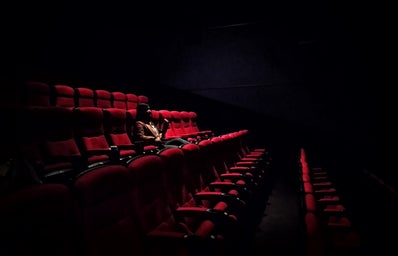On August 27, 2021, Halsey released one of the best albums of the year: If I Can’t Have Love, I Want Power, an exploration of femininity, birth, misogyny and rebirth. The album was produced by Trent Reznor and Atticus Ross of Nine Inch Nails, and these influences create heavy alternative effects on the album.
But not only did Halsey release an album, she also created an accompanying film. The film follows Queen Lila, (played by Halsey), who must deal with the hatred of her people when their beloved King dies. When she finds out she is pregnant, she begins a deadly adventure through love and power.
Halsey goes by the pronouns she and they, which will be used intermittently throughout this article.
The album begins with “The Tradition,” a story bringing listeners back to the medieval times, setting us up with the inequalities of women and the things they have been forced to endure throughout time. As the chorus sings, “take what you want, take what you can / take what you please, don’t give a damn / ask for forgiveness, never permission,” Halsey is introducing the heavy femininity and strength that follows the entire album. Its story-like structure truly guides listeners into Halsey’s world of If I Can’t Have Love, I Want Power.
In June of this year, Halsey gave birth to their first child, Ender, alongside their partner Alev Aydin. They created this album to bring listeners on the journey of creating and losing life with them. Having experienced a miscarriage in the past, Halsey knows how precious and terrifying being pregnant is. In the album’s final song “Ya’aburnee,” Halsey laments the loss of their child while looking forward to the future with the child growing inside of them: “And if we don’t live forever / Maybe one day, we’ll trade places / Darling, you will bury me / Before I bury you.” This song serves as a love letter to their unborn child, their partner and themself. It also offsets most of the rest of the album, which is filled with heavy, powerful songs. This being the last song serves as a reminder that while things may seem dark, there is always hope. While they struggled through numerous abusive relationships in the past, Halsey is now excited to welcome a new baby into the world with their partner, while also acknowledging that the world can be dark and scary. In the last verse, Halsey laments “But what’s worse? / Tellin’ you my feelings / Or to die without revealing / That you crawled inside my head / And set a fire there instead?” striking a chord of the delicate balance of protecting yourself, while also letting others in so you’re not so alone.
“I am not a Woman, I’m a God,” a fan favorite, is one of the most forceful songs on the album. As the title suggests, Halsey uses this song to assert the fact that they don’t feel happy being put into the box of “woman,” but rather sees themself as a God because of their power and their social status as a celebrity. But with godliness comes consequences, and Halsey’s chorus says as much: “I am not a woman, I’m a god / I am not a martyr, I’m a problem / I am not a legend, I’m a fraud / So keep your heart ’cause I already got one.” While they are celebrated and followed, this means they are also hated. Instead of just being a person, now they’ve become a “problem” in the eyes of those who wish to take their place or those who have deemed them unworthy of their position of power (as the townspeople have Queen Lila in the film). Halsey has transcended beyond gender, and become something more: something to worship, something to fear.
Towards the end of the album, “The Lighthouse” strikes a terrifying and dark chord. This song is my personal favorite of the album. Halsey sings about becoming a siren and luring men into the deep sea, only to meet the devil, as she had. While men perish at the bottom of the sea, the protagonist was transformed into a being of power and seduction. In the movie, Queen Lila stands on the balcony of her castle, looking out at her town, while “The Lighthouse” plays in the background. In the chorus, Halsey sings “There is a lighthouse / In thе middle of the deep / And I’m still stranded on thе shoreline there / And nobody hears me scream.” This plays perfectly seeing as her castle is the tallest tower in the town, becoming her lighthouse. She’s stranded in this position after being forced to confront the naysayers of the Kings guard, who have renounced her as their crown. She’s in unknown waters as she’s screaming for help, but no one is there to save her, except herself.
Halsey also appeared on NBC’s Saturday Night Live in order to promote their album alongside Kim Kardashian West. They sang “I am not a Woman, I’m a God” and “Darling,” a sweet lullaby for their children Ender and the baby they lost. They took the stage with Fleetwood Mac’s Linsey Buckingham and sang the beautiful yet sorrowful song. In “Darling,” Halsey sings “only you have shown me how to love bein’ alive” to their babies who have shown them the starring role of their life: to be a parent to them. They have felt lost in the past, trying to figure out why they’re on this planet, and now they’ve figured it out. Their love for their children is so powerful is shines through the heaviness of the majority of the album, as they sing their heart out with love for their babies.
Halsey’s declaration of love for her family and her fanbase takes center stage in “If I Can’t Have Love, I Want Power” while simultaneously making her force known. This is truly Halsey’s best album to date, losing the pop-focus she had in her last album “Manic” and trading it for alternative power. This album truly transports listeners to the medieval time and takes us on a journey through love and loss. “If I Can’t Have Love, I Want Power” is available for streaming on most music platforms, and the film is also available on HBO.


